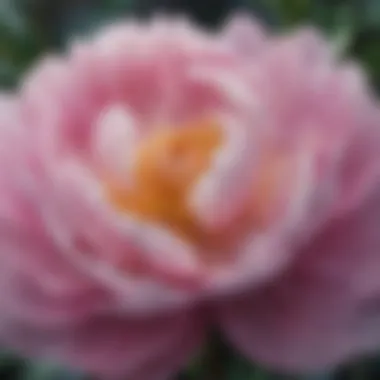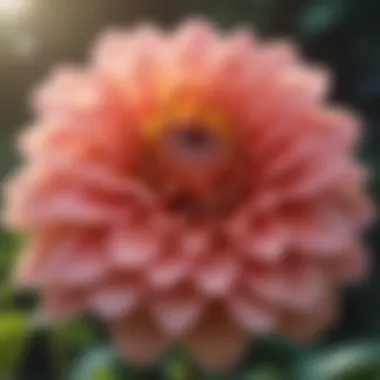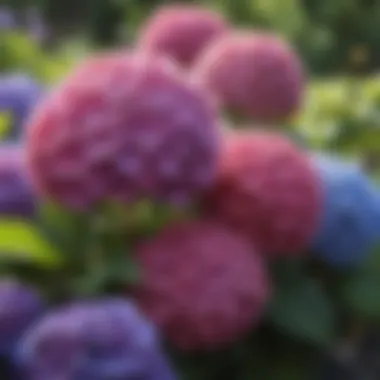Unlock the Beauty: Discovering the Finest Flower Plants for Your Garden


Outdoor Decor Ideas
When it comes to enhancing your garden with the best flower plants, outdoor decor plays a crucial role in creating a visually stunning environment. Seasonal inspirations can guide you in selecting the most appropriate blooms for each time of the year, ensuring a garden that blooms year-round. The choice of furniture should complement the beauty of the flowers, providing both functionality and aesthetic appeal. Decorative lighting can transform your garden into a magical space, illuminating the blooms and creating a captivating ambiance. Consider plant arrangements carefully to showcase the diversity of colors, shapes, and sizes of the flowers. Hardscaping solutions, such as pathways and borders, can add structure and elegance to your garden. Embracing sustainable practices, like water conservation and natural pest control, not only benefits the environment but also enhances the health of your flower plants.
Outdoor Entertaining
Hosting luxurious gatherings in your garden surrounded by beautiful flower plants can elevate any event. Implementing party planning tips can ensure that your gatherings are both elegant and memorable, incorporating the natural beauty of your garden into the decor and ambiance. Stay updated on al fresco dining trends to offer your guests a unique and sophisticated culinary experience amidst the blooming flowers.
Exclusive Destinations
Discover hidden gems where the most exquisite flower plants thrive, from secret gardens to botanical wonders. Luxury resorts that boast meticulously curated gardens can serve as inspiration for your own outdoor paradise. Private villas often feature opulent gardens that showcase rare and breathtaking blooms, providing a glimpse into the world of exclusive horticultural beauty.
Travel Guides
Exploring cultural experiences through gardens around the world can broaden your understanding of different floral landscapes. Immerse yourself in culinary adventures that highlight the connection between food and flowers, from edible blooms to garden-inspired dishes. Indulge in shopping escapades in destinations known for their vibrant flower markets and unique botanical offerings.
Home and Interiors
Bring the beauty of the outdoors inside by incorporating interior design trends that echo the charm of your garden. Home organization techniques can help showcase your flower plants as elegant focal points within your living space. Explore smart home innovations that enable you to integrate your garden seamlessly into your home environment, creating a harmonious blend of indoor luxury and outdoor beauty.
Introduction
The world of gardening offers a plethora of opportunities to immerse oneself in the beauty of nature and create an enchanting outdoor sanctuary. As you embark on the journey of selecting the best flower plants for your garden, you are venturing into a realm where colors, fragrances, and textures converge to transform your outdoor space into a picturesque oasis. This article serves as a guiding light, illuminating the path to choosing flower plants that resonate with your style and preferences.
In the realm of flora, the selection of flower plants plays a pivotal role in curating a garden that mirrors your personality and aesthetic sensibilities. Whether you envision a vibrant and colorful paradise or a serene haven adorned with delicate blossoms, the choice of flower plants sets the tone for your outdoor ambiance. With careful consideration and strategic planning, you can elevate your garden's allure to new heights, creating a space that not only pleases the senses but also nourishes the soul.
The essence of this exploration lies in the harmony between nature and design, where the symphony of colors, scents, and textures orchestrates a visual masterpiece in your outdoor space. By delving into the world of flower plants, you open the door to a realm of endless possibilities, where each bloom tells a story and each petal whispers secrets of natural beauty. Join us on this journey as we unravel the tapestry of floral splendor and unveil the secrets of creating a garden that blooms with grace and elegance.
Factors to Consider Before Choosing Flower Plants
When embarking on the journey of selecting flower plants for your garden, several crucial factors demand careful consideration to ensure the optimal growth and vibrancy of your botanical collection. Understanding the climatic suitability, sunlight requirements, and soil quality specific to your region plays a pivotal role in determining the success of your garden's floral display. By delving into these considerations with meticulous attention, you pave the way for a harmonious and thriving garden landscape that transcends mere aesthetics.


Climate Suitability
Succeeding in cultivating a flourishing garden heavily hinges on identifying flower varieties that align seamlessly with your regional climate variations. By grasping the nuances of climate suitability, you empower yourself to make informed decisions that promote sustainability and longevity in your gardening endeavors. Exploring the specific aspects of regional climate variations opens a door to a world of floral possibilities that thrive in your unique environment. Embracing these variations in your plant selection process not only ensures resilience but also enhances the overall allure of your green haven.
Sunlight Requirements
Commencing your horticultural journey requires a profound understanding of the sunlight requirements essential for nurturing diverse flower species. Drawing a clear distinction between the necessities of full sun exposure and the nuances of partial shade, guides your choice of plants towards fulfillment and blooming brilliance. Each aspect holds its own significance in the grand symphony of garden orchestration, offering a palette of possibilities to curate an enchanting oasis tailor-made to bask in the sunlight's caress or luxuriate in the gentle shade.
Soil Quality
Delving deeper, the foundation of any successful garden lies in comprehending the intricacies of soil quality, particularly in deciphering the significance of understanding soil pH levels. The key characteristic of understanding soil pH levels lies in its ability to act as a barometer for plant nutrient availability and overall health. By unraveling the unique features of soil pH level management, you equip yourself with the knowledge necessary to optimize plant growth and vitality. This vital information, rich in advantages, guides your plant selection towards a nourishing and favorable environment, fostering a garden that thrives with abundance and beauty.
Perennial Flower Plants
Perennial flower plants are an essential component of any well-planned garden. These plants offer the advantage of blooming year after year without the need for replanting, providing a sense of continuity and stability to your outdoor space. When selecting perennial flower plants, it is crucial to consider factors such as climate suitability, sunlight requirements, and soil quality to ensure they thrive in their environment. By choosing the right perennial flowers, you can create a garden that continually astonishes with its beauty and charm.
Roses
Roses are a timeless classic in the world of gardening, offering a wide array of varieties to consider for your garden. The different types of roses available provide versatility in color, scent, and blooming patterns, allowing you to tailor your garden to your preferences. Whether you opt for vibrant hybrid tea roses or delicate miniature roses, each variety brings its own unique charm to your outdoor space. When deciding on the types of roses to include, consider factors such as bloom size, color range, and fragrance intensity to create a harmonious and visually appealing garden landscape. Roses undoubtedly add a touch of elegance and romance to any garden setting.
- Varieties of Roses to Consider
Varieties of Roses to Consider
When choosing roses for your garden, explore options such as hybrid tea roses, floribunda roses, and climbing roses to add diversity to your floral display. Each type of rose has its distinctive characteristics, from the refined blooms of hybrid teas to the profuse clusters of floribundas. Hybrid tea roses, known for their classic bud shape, are ideal for creating stunning cut flower arrangements, while climbing roses can add vertical interest to your garden. Consider the growth habits, pruning requirements, and disease resistance of each rose variety to make an informed decision on the best roses for your garden.
Lavender
Lavender plants are prized for their aromatic foliage and delicate purple blooms, making them a popular choice for gardeners seeking to add a sensory dimension to their outdoor space. Growing lavender plants requires attention to specific care practices, such as well-drained soil, adequate sunlight, and proper pruning techniques. By providing the right conditions, you can enjoy a bountiful harvest of fragrant lavender each year. The alluring scent of lavender and its culinary and medicinal uses make it a versatile and valuable addition to any garden.
- Growing Tips for Lavender Plants


Growing Tips for Lavender Plants
To cultivate thriving lavender plants, ensure they receive at least 6-8 hours of sunlight daily and are planted in well-draining soil to prevent waterlogging. Prune lavender in the spring to promote bushy growth and prolific flowering. Consider using lavender in areas where its fragrance can be appreciated, such as near seating areas or pathways. While lavender is relatively low-maintenance, proper care is essential to ensure the plants thrive and flourish in your garden.
Daylilies
Daylilies are reliable perennial plants known for their vibrant blooms and hardy nature, making them a popular choice for garden enthusiasts. Caring for daylilies involves attention to watering, soil fertilization, and division to maintain their health and vigor. With a wide range of colors and bloom shapes available, daylilies allow for creative landscaping options in your garden. Incorporating daylilies into your outdoor space adds a splash of color and charm that lasts throughout the growing season.
- Caring for Daylilies
Caring for Daylilies
When tending to daylilies, ensure they receive ample moisture during the growing season but avoid overwatering to prevent root rot. Fertilize daylilies in early spring with a balanced fertilizer to promote healthy growth and abundant flowering. Divide large clumps of daylilies every few years to prevent overcrowding and rejuvenate the plants. By providing proper care and maintenance, you can enjoy the beauty of daylilies in your garden for years to come.
Annual Flower Plants
As we delve into the realm of annual flower plants, it is essential to grasp the significance they hold in transforming your garden into a vibrant masterpiece. Annuals provide a burst of color and vitality, enhancing the overall aesthetics of your outdoor sanctuary. Their versatility allows for seasonal variations, enabling you to refresh your garden landscape effortlessly. By understanding the specific elements and benefits of annual flower plants, you can curate a garden that captivates with an ever-changing display of blooms.
Petunias
Petunias stand out for their exquisite color variations, adding a touch of elegance to any garden space. The diverse range of colors available in petunias amplifies the visual appeal of your floral arrangements, creating a picturesque landscape. Their vibrant hues of purple, pink, white, and red inject a pop of color that is unmatched in the garden realm. Embracing petunias in your garden not only introduces a kaleidoscope of colors but also underscores your attention to detail and aesthetic refinement.
Color Variations in Petunias
Delving into the realm of color variations in petunias reveals a spectrum of shades that encompass the entire color palette. From pastel tones to vibrant hues, petunias offer a versatile selection to cater to every design preference. The key characteristic of color variations in petunias lies in their ability to create visual interest through contrasting or complementary colors. By incorporating different shades of petunias into your garden, you can craft visually captivating displays that elevate the allure of your outdoor oasis.
Marigolds
In the realm of annual flower plants, marigolds emerge as a steadfast choice, exuding charm and understated elegance. Embracing the benefits of planting marigolds not only adds a traditional touch to your garden but also enhances its insect-repelling properties. Marigolds' resilience and adaptability make them a popular choice among gardeners seeking vibrant blooms that require minimal maintenance.
Benefits of Planting Marigolds


Exploring the benefits of planting marigolds sheds light on their capacity to deter pests naturally, promoting a healthier garden ecosystem. The key characteristic of marigolds lies in their ability to repel insects, safeguarding other plants from potential harm. By opting for marigolds in your garden landscape, you benefit from their pest-repelling qualities while enjoying a continuous bloom of cheerful flowers.
Zinnias
When considering annual flower plants, zinnias come forth as a valuable addition, boasting distinctive growth patterns and a profusion of blossoms. Their resilience in various climates and soil conditions makes them a favorable choice for gardeners aiming to create a dynamic floral display. Zinnias' vibrant blooms and extended blooming period ensure a continuous spectacle of color throughout the gardening season. their versatile nature and adaptability contribute to their widespread popularity in garden landscapes.
Growth Patterns of Zinnias
Exploring the growth patterns of zinnias unveils their tendency to thrive in diverse environments, flourishing even in challenging conditions. The key characteristic of zinnias' growth patterns lies in their ability to adapt to different soil types and sunlight levels, making them a versatile choice for various garden settings. By understanding the unique features of zinnias' growth patterns, you can leverage their advantages to cultivate a visually striking garden arrangement that mesmerizes beholders.
Low-Maintenance Flower Plants
In this section, we delve into the realm of low-maintenance flower plants, shedding light on their significance in the broader scope of garden cultivation. The concept of low-maintenance flora holds a pivotal role in landscaping and gardening practices for individuals seeking efficiency and ease in upkeep. These plants require minimal attention and care, making them ideal for busy individuals or novice gardeners. Their ability to thrive with little intervention showcases their resilience and adaptability to varying environmental conditions, adding a layer of convenience to the gardening experience. Exploring low-maintenance flower plants offers a spectrum of options for transforming outdoor spaces without the demanding maintenance schedules typically associated with traditional gardening practices.
Succulents
Watering Guidelines for Succulents
Diving into the specifics of watering guidelines for succulents, we uncover a crucial aspect influencing the health and growth of these unique plants. Succulents, renowned for their ability to store water in their leaves and stems, possess distinct watering requirements compared to conventional flowering plants. Understanding the proper watering techniques for succulents is paramount in ensuring their longevity and vitality. The key characteristic of watering succulents lies in infrequent but thorough watering to mimic their natural habitat conditions, preventing waterlogged soil and root rot. This method of controlled hydration is instrumental in fostering strong, resilient succulents capable of thriving in diverse climates. Embracing the distinctive watering guidelines for succulents proves advantageous in conserving water, promoting sustainability, and cultivating a flourishing garden ecosystem geared towards low-maintenance beauty.
Coneflowers
Attributes of Coneflowers
Analyzing the attributes of coneflowers unveils a plethora of qualities that contribute to their appeal in garden landscapes. Coneflowers, known for their daisy-like appearance and vibrant hues, offer a distinctive charm that complements various garden settings. Their tolerance to drought conditions and ability to attract pollinators make them a popular choice among gardening enthusiasts seeking both aesthetic and ecological benefits. The key characteristic of coneflowers lies in their resilience to harsh environmental factors, showcasing adaptability to diverse soil types and weather conditions. This unique feature positions coneflowers as a versatile and dependable option for creating visually stunning and environmentally supportive garden spaces. Exploring the attributes of coneflowers sheds light on their advantages in enhancing garden biodiversity and longevity, making them a valuable addition to any landscape design.
Black-Eyed Susans
Gardening Tips for Black-Eyed Susans
Delving into the realm of gardening tips for black-eyed susans uncovers essential insights into the care and cultivation of these charming flowering plants. Black-eyed susans, known for their golden petals and dark centers, thrive in sunny locations with well-drained soil, showcasing a preference for ample sunlight and moderate watering. The key characteristic of gardening black-eyed susans lies in providing adequate space for growth, ensuring proper air circulation and preventing overcrowding. This beneficial practice encourages robust flowering and reduces the risk of pest infestations or disease development. Implementing the gardening tips tailored for black-eyed susans offers a roadmap to nurturing healthy plants and fostering a vibrant garden ambiance rich in color and vitality. Understanding the unique features of black-eyed susans and their role in an ecosystem contributes to the overall success of gardening initiatives, promoting sustainability and visual charm in outdoor spaces.
Conclusion
In essence, the significance of the conclusion lies in its ability to provide a consolidated overview, making it easier for readers - whether they are luxury travel curators seeking to enhance the ambiance of high-end resorts, fine dining consultants looking to beautify restaurant gardens, or personal stylists envisioning glamorous settings for their clients - to grasp the essence of the entire discourse. By underlining the notable features of each flower plant category - from perennials like roses and daylilies to annuals such as petunias and zinnias, not forgetting low-maintenance gems like succulents and coneflowers - the conclusion acts as a compass guiding enthusiasts towards making informed decisions in selecting the perfect blooms for their specific needs.
Furthermore, the conclusion acts as a signpost for readers to revisit and reinforce their understanding of the diverse factors that influence the success of planting flower species, be it climate considerations, sunlight requirements, or soil quality. This retrospective glance aids in solidifying the knowledge gained from the preceding sections, equipping readers with a comprehensive toolkit to navigate the varied complexities involved in cultivating an aesthetically pleasing and flourishing garden.







